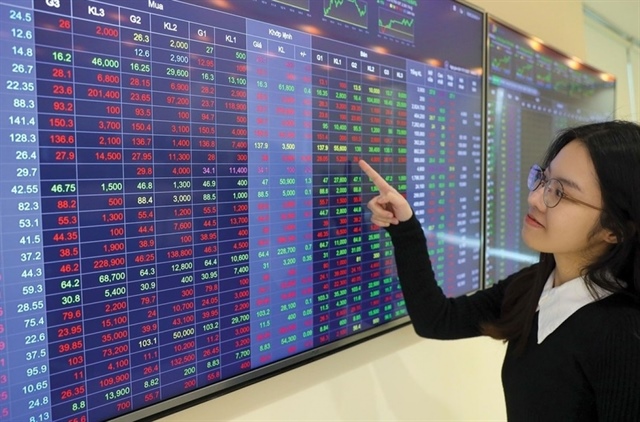Market stabilises but fears remain
Market stabilises but fears remain
Despite the domestic stock market getting back on track after a drastic plunge last week, a long-term rally remains uncertain.

The “Black Monday” panic
“Terror is a suitable word to describe the Vietnamese stock market last Monday, as it underwent the most terrible session of the whole year and the VN-Index lost 5.28 per cent to stand at only 526.93 points,” said Tran Quang Binh, deputy head of Retail Research at Maybank Kim Eng Securities.
The market panic was expressed in the massive drop in tickers, with the VN-Index witnessing 249 losers, of which 129 hit their nadir.
The HNX-Index also dropped by 5.81 per cent to close at 73.09 with 205 losers, of which 74 hit the floor. Liquidity levels remained high, with the total transaction value reaching VND3,800 billion ($168.6 million) across the two exchanges.
Within one month, the VN-Index lost roughly 112 points, equivalent to 17.5 per cent.
Investors all around the world have been scared by the benchmark Shanghai Composite and Jakarta Stock Exchange Composite indices falling more than 20 per cent and 15 per cent, respectively. Also, the Dow Jones, ASX 200, and FTSE 100 all decreased around 6 per cent. Frankfurt's DAX recorded a fall of more than 20 per cent from its April peak, and its gains for 2015 had been also wiped out.
The sentiment root
The global stock markets’ dramatic decline, led by the unexpected devaluations of the Chinese yuan and plumetting oil prices, together with tensions on the Korean peninsula and negative updates on the domestic banking system, was said to jointly create a very negative psychological effect that had very real impacts on the market.
“It seems sentiment has been a key driver of this recent huge correction,” said Le Anh Tuan, director and head of Research Section at Dragon Capital Management.
Over the past month, the Greed & Fear index, used to measure investors’ stock market sentiment and calculated by CNN Money remained at “extreme fear”.
Tuan also said that the Volatility Index (VIX) rose to 38, up from 14 in just a few days (up 170 per cent), indicating that investors remained greatly concerned about recent declines in global stock markets.
“Over the last 25 years, a VIX score of 38 was only lower than in 1998’s 44 score when Russia’s default happened, in 2008 when the VIX hit 60 as a result of the world financial crisis. It was also lower than in 2011, when the European Union was facing the question of whether it would form a union or not,” he added.
Compounding the effects of global anxiety, local sentiment was dampened as the result of Deutsche Asset and Wealth Management’s (Deutsche AWM) decision to de-list the FTSE Vietnam UCITS ETF from the Stockholm-based Nasdaq OMX and Paris-based Euronext, starting from September 25. This triggered the fear that foreign investments would soon find their way out of the economy.
The action by Deutsche AWM, however, would not “significantly affect the Vietnam stock market” due to the modest liquidity of the two aforementioned exchanges compared to the other eight listed ones, according to analysts from VPBank Securities.
The impressive bounce back
Vietnam’s stock markets have shown some signs of recovery following the recent dramatic fall. The VN-Index was up at the close of four consecutive trading sessions since August 25, and has regained even more than the points lost from the beginning of the week. At the end of August 28, the index peaed at 570.87 points, up 43.94 points (8.3 per cent) in comparison with the level seen on Black Monday.
Leading stocks from the banking, insurance, and consumer sectors rebounded significantly (including BID, ACB, VCB and PVC), helping the HNX index to reach a high of 78.27 points, up 5.18 points against last Monday’s trough.
A brighter future was pointed out by Retail Research manager at Viet Capital Securities Nguyen The Minh. “As the global market remains volatile, long-term investors will seek markets with lower risks, and Vietnam is a suitable candidate, especially with the upcoming free trade agreements (FTAs) that could give a boost to the economy,” he said.
With seafood and textile exports expecting huge benefits from the FTAs, the stocks of securities firms are likely to rise in tandem with the increase in foreign ownership.
Furthermore, Minh believes that following the recent fall, stock prices are now more affordable, and as a result, foreigners would return to a net buying position, especially after foreign exchange volatilities cool down at the end of 2015.
Uncertainty lingers
Despite the gradual rebound, analysts still warn that the current bounce back is a short-term adjustment, and market volatility is still possible in the time to come.
“There are still unsettled factors that could affect the stock market’s recovery,” said financial expert Vo Tri Thanh.
Thanh drew attention to the US Federal Reserve’s (FED) forthcoming move to raise interest rates for the first time in nearly a decade. A high rate would make American debt relatively more attractive to investors, which means they could dump debts and investments in emerging markets like Vietnam.
On August 27, the US Department of Commerce announced that the US’s gross domestic product expanded at a seasonally-adjusted annual rate of 3.7 per cent in the spring, faster than the initial estimate of 2.3 per cent. Other recent reports have shown gains in consumer confidence, retail sales, and home building – hints of solid economic growth which could increase the likelihood of the FED taking action soon.
Moreover, Thanh cited the current oil price moving towards $40 per barrel, while costing about $100 a year ago. The falling price undermines the attractiveness of listed oil tickers, including the sector’s key drivers, like PVD of the PetroVietnam Drilling Corporation and GAS of PetroVietnam JSC.
Since early August, market price of the GAS recorded a loss of 34.2 per cent while the same figure for PVD was 28.2 per cent. Furthermore, “the oil price is being threatened by a further decrease due to the unsolved supply surplus,” said Military Bank Securities senior analyst Do Bao Ngoc, adding that the slowdown of China’s economy would further lower the demand.




























